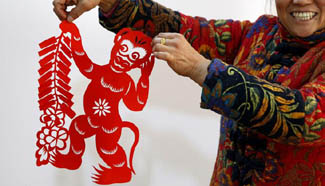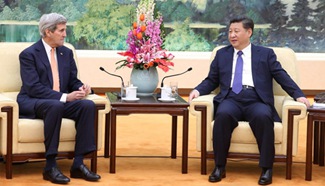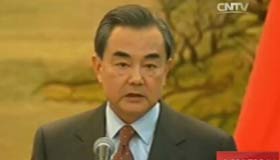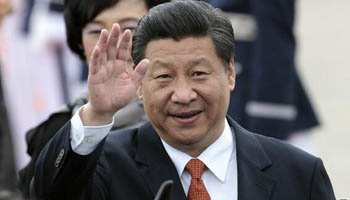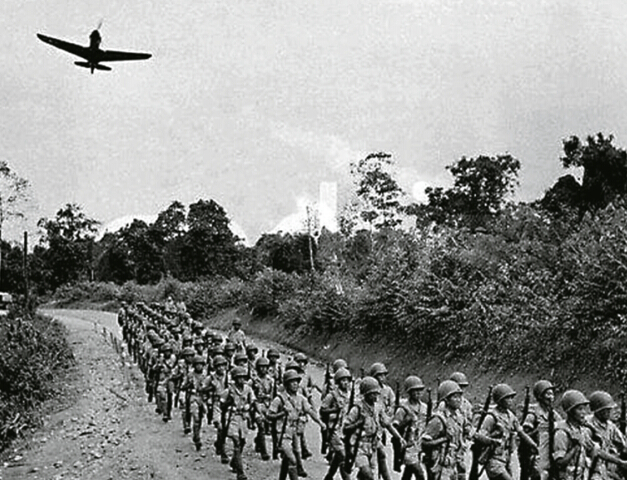
????Seventy years have passed. Even the youngest ex-soldiers are gray and weak, unable to see and speak clearly. But, asked about the battles they fought, their minds are focused and spirits fired. They tell their stories, hoping younger generations will not forget the bloody history of the Chinese nation.
????Courageous scout
????Liu Wanfu, 92, occasionally tells his son of his past as a soldier. His comrades-in-arms had called him “Blind Liu” after he lost his sight temporarily, and was successfully treated when he was just a new recruit.
????Liu, a leading scout in his regiment, had joined the army in 1941 and left in 1949. He said he killed his first Japanese soldier in 1942 when more than 60 Japanese troops threatened to overrun the regiment headquarters.
????“At the time, each of us only had eight bullets and we did not load our guns. But a Japanese soldier was coming at me with a bayonet. Terrified, I loaded my gun immediately and shot him.”
????Liu and four other scouts were sleeping one night, when he awoke to find Japanese troops had seized their guns and were tying them up. He thought the Japanese might have mistaken him as one of the two civilians in their team and ordered him to tie up the others. Liu seized the opportunity and ran. But he suddenly thought of his gun: “A precious gun was life itself.” Liu wanted to steal one from a nearby Japanese sentry post, but when he saw there were four sentries, he decided to run again.
????When he was out of danger, he began to curse the enemy. But then he realized that they would quickly notice one man was missing. He ran again in the dark for a good three hours before he arrived at the regiment headquarters. His commander said: “Thanks to your report our regiment has been saved.”
????He had lost a gun, but Liu was commended rather than punished. “I outran the Japanese and gained the initiative in the battle for my regiment. But my lungs were injured in the run and I have coughed very badly ever since. If not for that, I would have stayed in the army longer.”
????On retirement, Liu was rewarded with a horse -- his troop had only three horses at the time – to help with farm work back home. Liu worked hard and lived simply, telling his war stories to those who will listen.
????“The spirit of struggle and sacrifice should be remembered by our descendants,” he says.
????No hero – just a survivor
????Ning Xizhen, 94, was a 20-year-old soldier in the Chinese expeditionary forces fighting Japanese aggression in India and Myanmar.
????“I am no hero – just a survivor of the war,” says the veteran who was present when Chinese forces accepted the Japanese surrender both in central Hunan’s Zhijiang Township and in Nanjing.
????Ning’s memory is dotted with turning points.
????In 1940, the Japanese occupied Ning’s hometown in north China’s Shanxi Province. The young patriot enrolled at the Huangpu Military Academy in Chengdu. On graduation in 1943, he and 18 classmates prepared to join the guerrilla war in enemy-occupied areas. However, he was eventually deployed to the expeditionary forces and flew over the “Hump” to India and became an intelligence officer.
????The hardships of war exceeded his wildest imagination. “Our equipment was so inferior to the enemy’s,” he recalls. Ning had to break through a Japanese blockade in northern Myanmar and take a battlefield map to his commanders by himself at the end of 1943. It took him a whole day from morning to dawn the next day to cross several kilometers of jungle under intense fire. But he succeeded and helped to thwart enemy reinforcements.
????During the battles that followed, Ning was promoted to platoon leader. In the last battle he fought in Myanmar, Ning and his comrades were ambushed when they were on a boat on a river. Several of them drowned after being injured.
????“Bullets were flying and soldiers went down one by one.” Ning ordered the others to abandon the boat. They used flags to signal the artillery on the bank to cover them as they swam for land. More than a dozen soldiers were killed in the battle and Ning suffered minor injuries. “You could keenly feel the ruthlessness of war at that time.”
????Ning still recalls his happiness at the news of Japan’s unconditional surrender in August 1945. “Everyone sang and danced. The feeling could not be possibly expressed in words.” His troop participated in security missions at the surrender ceremonies in Zhijiang and Nanjing, witnessing the most honorable moments of victory.
????War left a profound impression on Ning. Stooped and barely able to hear, he has a big voice and a clear mind. He always wears his medals when visitors come. He repeats: “I am no hero – just a survivor of the war. Today’s peace cost the lives of countless soldiers, who were real heroes. I hope there is no more war.”
????The “savage mountains”
????Liu Guiying, 95, sits in her narrow old house in east China’s Anhui Province, watching the constant rain through the window.
????She remembers the rain 73 year ago. As a nurse in the expeditionary forces, the 22-year-old from Hunan Province was moving through the jungle in northern Myanmar. Rain fell loudly on the tree leaves.
????She was soaked through despite an oilskin cloak. “The rain was like someone above pouring water directly on the earth. Creeks quickly became rivers. We were desperate.”
????Liu hated the rain. She clearly recalls the details of the retreat through the “savage mountains”: the long, unbroken chain of mountains, with ancient trees like huge umbrellas, and a rainy season that seemed never to end.
????At the end of April 1942, allied forces of China and Britain were on the retreat. Liu and her troop had to fall back by way of the mountains. She managed to get to India -- one of the very few women to survive.
????“It was tragic. Bodies were everywhere, so were maggots. Of the five nurse sisters, I was the only survivor,” she says.
????She still remembers the names of her comrades. “They died too young.”
????Liu recalls the troops entered Myanmar on March 12, 1942. U.S. aircraft covered them in the air. Tanks, gun carriers, artillery caissons and infantry trucks moved in a long line. Local people played gongs and drums, and gave them flowers and wine along the way.
????It was the first time Chinese troops had fought in a foreign land since their defeat in the first Sino-Japanese War of 1894-1895. Soldiers held their heads high and sang a battle song on the way: “Guns are on our shoulders, blood is in out chest. Let’s go to Myanmar, go to the international battlefield.”
????Liu’s memories are painful. She has dreamed of the war on countless nights: bandaging the injured; the soldiers who burned themselves to death to avoid capture; the poisonous insects and snakes, and the wild animals that killed her comrades; as well as the hunger, malaria and the enemy – all of these in the dense jungle and heavy rain.
????Liu was too shaken to talk about those memories for a long time. Her children only heard them in recent years. She collected half a bookcase of materials on the expeditionary forces. She used to sit in the porch and weep. But she never regretted joining the army. “When a war comes, it is everyone’s responsibility to fight. I was only doing my duty.”
????Liu remembered the last words of her head nurse, Hu Shan: “We died for our country; we sacrificed our youth and lives. If you return, you must tell our stories.”
????In 2005, the Central Military Commission awarded her a gold medal on the 60th anniversary of victory in the war.




